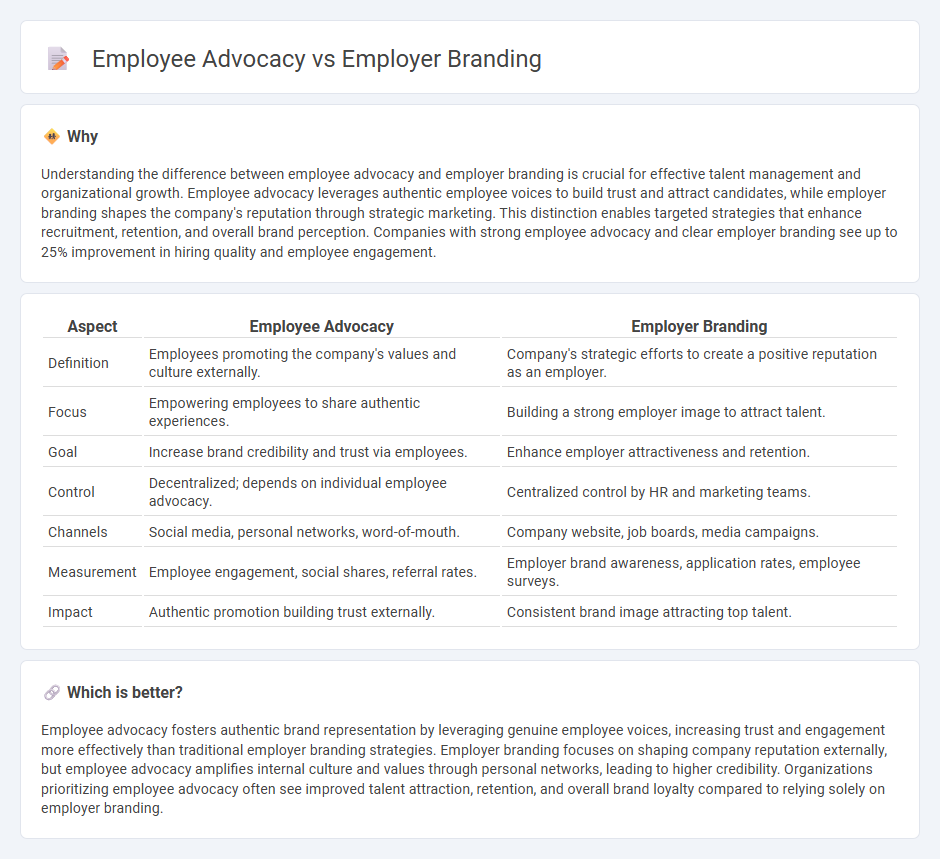
Employee advocacy harnesses the genuine voices of staff to amplify a company's reputation, fostering trust and authentic engagement among target audiences. Employer branding focuses on crafting a strategic image to attract top talent by highlighting company culture, values, and benefits. Discover how integrating these approaches can elevate your organization's market presence and talent acquisition efforts.
Why it is important
Understanding the difference between employee advocacy and employer branding is crucial for effective talent management and organizational growth. Employee advocacy leverages authentic employee voices to build trust and attract candidates, while employer branding shapes the company's reputation through strategic marketing. This distinction enables targeted strategies that enhance recruitment, retention, and overall brand perception. Companies with strong employee advocacy and clear employer branding see up to 25% improvement in hiring quality and employee engagement.
Comparison Table
| Aspect | Employee Advocacy | Employer Branding |
|---|---|---|
| Definition | Employees promoting the company's values and culture externally. | Company's strategic efforts to create a positive reputation as an employer. |
| Focus | Empowering employees to share authentic experiences. | Building a strong employer image to attract talent. |
| Goal | Increase brand credibility and trust via employees. | Enhance employer attractiveness and retention. |
| Control | Decentralized; depends on individual employee advocacy. | Centralized control by HR and marketing teams. |
| Channels | Social media, personal networks, word-of-mouth. | Company website, job boards, media campaigns. |
| Measurement | Employee engagement, social shares, referral rates. | Employer brand awareness, application rates, employee surveys. |
| Impact | Authentic promotion building trust externally. | Consistent brand image attracting top talent. |
Which is better?
Employee advocacy fosters authentic brand representation by leveraging genuine employee voices, increasing trust and engagement more effectively than traditional employer branding strategies. Employer branding focuses on shaping company reputation externally, but employee advocacy amplifies internal culture and values through personal networks, leading to higher credibility. Organizations prioritizing employee advocacy often see improved talent attraction, retention, and overall brand loyalty compared to relying solely on employer branding.
Connection
Employee advocacy significantly enhances employer branding by leveraging authentic voices within the organization to promote company values and culture externally. Engaged employees sharing positive experiences on social media and professional networks increase brand visibility and credibility, attracting top talent and customers. This symbiotic relationship strengthens organizational reputation, builds trust, and supports competitive advantage in talent acquisition and retention.
Key Terms
Employer Value Proposition
Employer branding centers on shaping a company's Employer Value Proposition (EVP) to attract and retain top talent by communicating unique workplace culture, benefits, and growth opportunities. Employee advocacy amplifies the EVP by encouraging employees to share their genuine experiences, enhancing authenticity and trust among prospective candidates. Explore how aligning EVP with employee advocacy strategies can strengthen talent acquisition and brand reputation.
Brand Ambassadors
Employer branding shapes a company's reputation to attract top talent, while employee advocacy leverages current staff to promote that brand authentically. Brand ambassadors serve as the pivotal link, amplifying employer brand messages through genuine employee experiences and social channels. Discover how to harness Brand Ambassadors for maximum impact in your talent strategy.
Talent Attraction
Employer branding establishes a company's reputation and image to attract top talent by highlighting unique values, culture, and benefits. Employee advocacy leverages current employees' authentic voices to promote the organization, enhancing credibility and reach within their networks for talent attraction. Discover how integrating these strategies can transform your recruitment success and build a strong talent pipeline.
Source and External Links
What is Employer Branding? Definition And What It Means for Your Company - Employer branding is the strategic process of creating and maintaining your company's reputation as a great place to work, focusing on company culture, values, and employee benefits to attract and retain top talent.
Employer branding - Employer branding involves marketing the entire employment experience and shaping an employer's reputation as a place to work, distinct from the corporate brand aimed at customers; it centers on the employee value proposition to attract, engage, and retain talent.
What is employer branding? - Employer branding is how a company is perceived as a workplace by current, past, and potential employees and helps attract people aligned with company culture while reducing turnover and hiring time.
 dowidth.com
dowidth.com